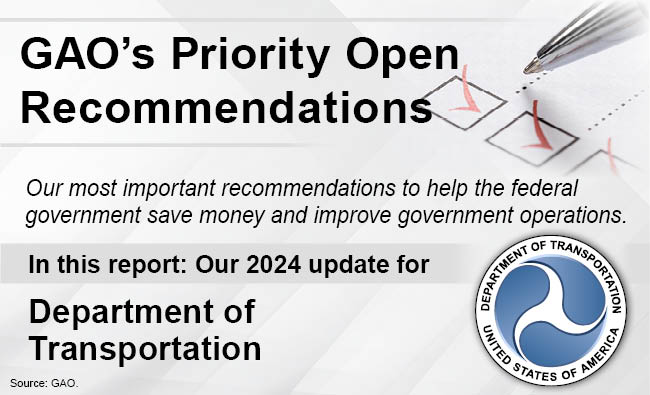Priority Open Recommendations: Department of Transportation
Fast Facts
Each year, we make more than 1,000 recommendations to help the federal government save money, address issues on our High Risk List, and significantly improve government operations.
This letter to the U.S. Department of Transportation outlines 20 open recommendations that it should prioritize. For example, in December 2023, we recommended that DOT update the lifecycle cost estimate of its multibillion-dollar airspace modernization program—one of 8 priority recommendations on transparency and open communication.
DOT implemented 2 recommendations we identified as a priority last year. We regularly update priority recommendations here.

Highlights
What GAO Found
In May 2023, GAO identified 20 priority recommendations for the Department of Transportation (DOT). Since then, DOT implemented 2 of those recommendations. Specifically, DOT has taken actions to understand the implementation of a cybersecurity framework by entities across the transportation sector, which provides opportunities to focus resources for risk mitigation efforts. DOT has also taken actions to enhance the climate resilience of federally funded roads through grants, guidance, and training opportunities.
In addition to the 2 priority recommendations DOT implemented, GAO removed the priority status from one recommendation related to motor carrier performance due to actions taken by Congress and DOT.
In June 2024, GAO identified 3 new priority recommendations for DOT, bringing the total number to 20. These recommendations involve the following areas:
- improving transparency and communication,
- addressing safety risks,
- developing comprehensive plans,
- managing cybersecurity risks and information technology, and
- reducing fraud and abuse risks.
DOT's continued attention to these issues could lead to significant improvements in government operations.
Why GAO Did This Study
Priority open recommendations are the GAO recommendations that warrant priority attention from heads of key departments or agencies because their implementation could save large amounts of money; improve congressional and/or executive branch decision-making on major issues; eliminate mismanagement, fraud, and abuse; or ensure that programs comply with laws and funds are legally spent, among other benefits. Since 2015 GAO has sent letters to selected agencies to highlight the importance of implementing such recommendations.
For more information, contact Heather Krause at (202) 512-2834 or KrauseH@gao.gov.
